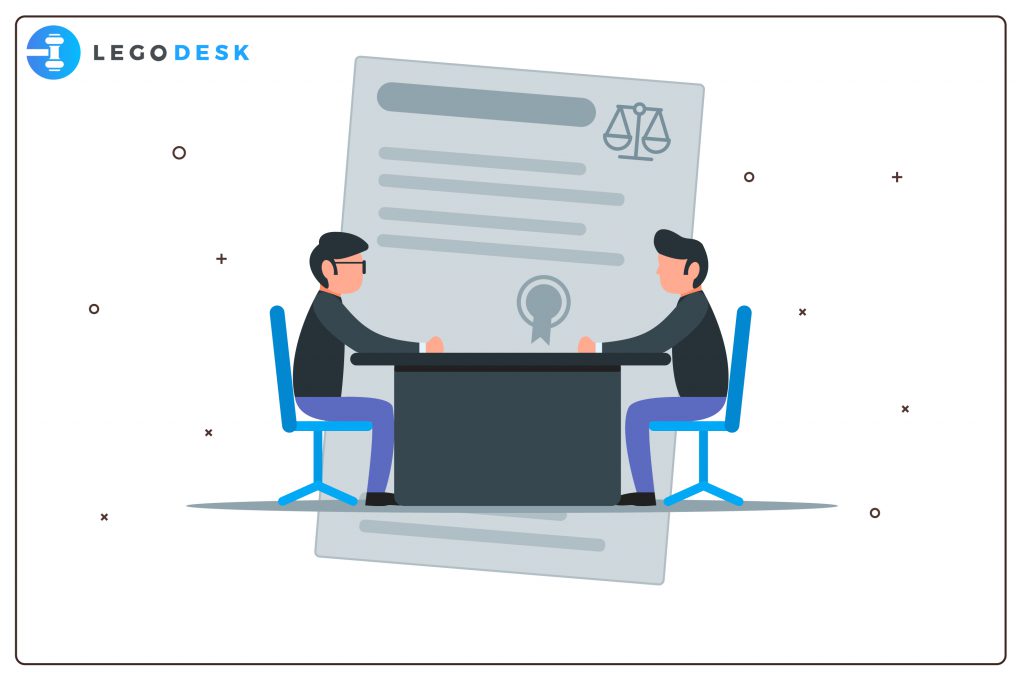Ever wondered what are the major differentiators between agreements and contracts? Read on to find out.
What is an Agreement?
Meaning: An agreement is the meeting of minds or a mutual understanding between two or more persons about their reciprocal rights and duties regarding past or future performances
Definition: The Indian Contract Act, 1872 defines the term “Agreement” under its section 2 (e) as “every promise and every set of promises, forming the consideration for each other”.
Interpretation: An agreement refers to an arrangement or understanding between two or more parties with respect to their responsibilities and rights to one another.
What is a Contract?
Meaning: However, a Contract refers to an agreement between two or more parties creating mutual obligations enforceable by law.
Definition: The Indian Contract Act, 1872 defines the term “Contract” under its section 2 (h) as “An agreement enforceable by law”.
Interpretation: A contract is an agreement between two or more parties to perform a service, provide a product or commit to an act and is enforceable by law.
Types of Agreements
- Valid Agreement
- Void Agreement
- Wagering Agreement.
- Void Agreement.
- Voidable Agreement.
- Implied Agreement.
- Express Agreement.
- Conditional Agreement.
- Illegal Agreement.
Types of Contracts
There are various types of contracts with their respective terms and conditions. They include:
- Valid Contracts
- Void Contract
- Voidable Contract
- Illegal Contract
- Unenforceable Contract
- Express Contract
- Implied Contract
- Quasi Contract
- Executed Contract
- Executory Contract
- Unilateral Contract
- Bilateral Contract
Looking for lawyers to draw up a contract? Find out lawyers with Legodesk..Sign up Now!!!
Agreement vs Contract – Key Differences
The two words- agreement and contract- are often used interchangeably. However, there are a number of differences between both of them. Additionally, the following are the key differences between Agreements and Contracts:
MEANING:
An Agreement refers to an informal arrangement between two or more parties who consent to do or refrain from doing something. A contract, on the other hand, is a formal arrangement between two parties which is enforceable in a court of law.
SECTION:
The Indian Contract Act, 1872 defines the term “Agreement” under its Section 2 (e) and defines the term “Contract” under Section 2 (h).
ENFORCEABILITY:
An Agreement is not enforceable by the court of law whereas a contract is enforceable by the court of law.
REQUIREMENTS:
An Agreement simply needs to be agreed upon by two or more parties once they have a mutual understanding between them. The only requirement is the “meeting of minds”.
A Contract, however, must have the following elements for it to be legally binding in the court of law
- Agreement
- Intention to Create Legal Relations
- Lawful Consideration
- Competent Parties
- Free Consent
- Lawful Object
- Not Expressly Declared Void
FORMALITY:
An Agreement refers to an informal arrangement between two or more parties whereas a Contract refers to a formal agreement between two or more parties.
ELEMENTS:
The essential elements of an Agreement include offer and its acceptance by the same person to whom it is made, for adequate consideration. However, in the case of a contract, the major elements include an agreement and its enforceability by law.
Written or ORAL:
An Agreement can be Oral or Written. A Contract is normally made in a Written form for it to be enforceable in the court of law.
SCOPE:
The scope of an Agreement is considered to be Narrow whereas the scope of a contract is considered to be relatively wider than an agreement sine all contracts are agreements.
LEGAL OBLIGATION:
The agreement does not legally bind the parties for the performance of the agreement. In the case of a Contract, however, the parties are legally bound to perform their part.
Try Your All in one legal practice management software – Sign Up Now!
Agreements and Contracts- Similarities
Although Agreements and Contracts are different they also have certain similarities. The following are some elements that are common between Agreements and Contracts:
- Offer– An offer refers to a promise in exchange for performance by another party
- Acceptance– Acceptance of an offer refers to assent to the terms specified in the proposal.
- Consideration– It can either be liquid cash, some other form of property, or a promise to perform an act. or refrain from an act.
Read Also – Contracts- Not just Legal Documents but a Human Process
All Contracts Are Agreements but all Agreements Are Not Contracts
This statement can be understood with the help of the below-mentioned formulae:
AGREEMENT= Offer + Acceptance
CONTRACT= AGREEMENT + Legal Enforceability
Therefore, it can be clearly seen that an agreement forms part of a contract since, for a document to be considered a contract, there first needs to be an agreement i.e. a mutual understanding between two or more parties with respect to the offer and subsequently, there is an acceptance of the terms of the offer. Once the terms have been agreed upon, a written contract is drawn and signed by the interested parties and the document is registered. Thus, the said parties and now bound to perform their duties and the said contract also becomes enforceable in a court of law.
Read Also – Complete Guidelines About Joint Venture Agreement
Examples
Example of an Agreement
Meehika and Rahul mutually decided to go for dinner on Friday Night. However, when the day came, Rahul had to work overtime and could not meet Meehika. As a result, Meehika lost valuable time. Here Meehika cannot sue Rahul for damages as the decision to go for Dinner is not a contract but merely a domestic agreement.
Read Also – Overview on Employment Bond – Indians Don’t Know
Example of a Contract
Preeti takes a loan of Rs. 1 Lakh from a Lender. Her brother Pradeep promises in writing to the lender that he would pay off his sister’s loan if she were to default on the monthly installments. Preeti repaid the initial few installments of the loan after which she went bankrupt. The lender reaches out to her brother Pradeep and asks him to pay on his sister’s behalf. Pradeep refuses to pay. Now, the lender has every right to sue Pradeep for damages as well as recover the balance part of the loan since the agreement to stand in as surety was in writing and registered and is enforceable in the court of law.
Looking for lawyers to draw up a contract? Find out lawyers with Legodesk..Sign up Now!!!
Conclusion
To sum up, it can be said that Agreements and Contracts are similar but surely not the same. Agreements may be preferred if the parties involved have a long-standing trust and the matter under question only needs an informal arrangement. However, it is advisable to draw up a contract between parties if the matter in question is more official and commercial in nature. Both Agreements and Contracts have their respective pros and cons. It is important to identify where one needs to draw up a contract and where an agreement will suffice.


